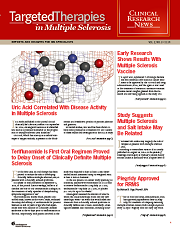Publication
Article
Targeted Therapies: Multiple Sclerosis
Uric Acid Correlated with Disease Activity in Multiple Sclerosis
Author(s):
In a study published in the journal Clinical Chemistry and Laboratory Medicine, investigators identified uric acid as a potential biomarker in the progression of multiple sclerosis disability.

In a study published in the journal Clinical Chemistry and Laboratory Medicine on September 20, 2014, investigators Moccia et al identified uric acid as a potential biomarker in the progression of multiple sclerosis (MS) disability.
Uric acid, which has activity as a natural scavenger of oxygen radicals, is present in the bloodstream as a breakdown product of purines (adenine and guanine). In animal studies, uric acid has been shown to have some potential as a treatment for MS.1 Results of these studies led investigators in the CCLM study to search for a relationship between MS severity and levels of uric acid. In the case-control study, using propensity score matching, investigators paired 362 patients with MS and 181 control individuals without MS.1
To reduce variation between populations, investigators corrected data for patient age, gender, and kidney function. Upon regression analysis, investigators identified a significant association between low levels of serum uric acid among patients with MS compared with controls, with an R-squared value of 30.4% and significance determined at a P value level of 1.4%.1
Longer disease duration was associated with a longer time from diagnosis and a higher Expanded Disability Status Scale (EDSS) score (P < .001, all comparisons). These findings suggest that uric acid levels may be a biomarker of MS disability and progression, even though previous studies suggest that uric acid may have a limited role as a disease marker and as a therapeutic target in MS.1
For example, a 2006 analysis, published in the journal Clinical Neurology and Neurosurgery, found that uric acid levels did not change as a result of immunomodulatory or immunosuppressive drug treatment in patients with MS.2
In addition, in the ASsociation of Inosine and Interferon beta in relapsing- remitting Multiple Sclerosis (ASIIMS) trial, investigators administered a precursor of uric acid—inosine—to patients with MS in conjunction with interferon-beta over the course of 2 years. The results of this trial were negative, and uric acid did not have any additional benefit on disability outcomes versus interferon-beta alone.3
Despite the negative result of the ASIIMS trial, antioxidative drugs may have a future in treatment of MS. However, uric acid may be a biomarker— not a treatment modality. Studying uric acid may help physicians predict the progression of MS in patients, although previous research indicates that uric acid levels do not predict response to treatment,2 and supplementation with uric acid does not alter the progression of disability in MS.3 Further study will be necessary to determine whether or not drugs that mimic the effects of uric acid are of any value.
References
1. Moccia M, Lanzillo R, Palladino R, et al. Uric acid: a potential biomarker of multiple sclerosis and of its disability [published online September 20, 2014]. Clin Chem Lab Med. doi:10.1515/cclm-2014-0744.
2. Rentzos M, Nikolaou C, Anagnostouli M, et al. Serum uric acid and multiple sclerosis. Clin Neurol Neurosurg. 2006; 108(6):527-531.
3. Gonsette RE, Sindic C, D’hooghe MB, et al. Boosting endogenous neuroprotection in multiple sclerosis: the Association of Inosine and Interferon beta in relapsing-remitting Multiple Sclerosis (ASIIMS) trial. Mult Scler. 2010;16(4):455-462.
2 Commerce Drive
Cranbury, NJ 08512
All rights reserved.






